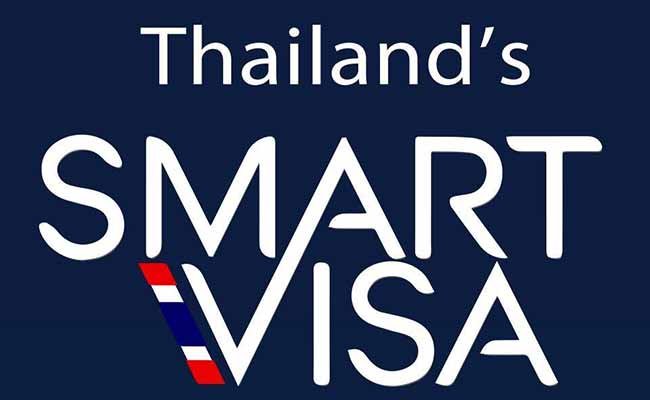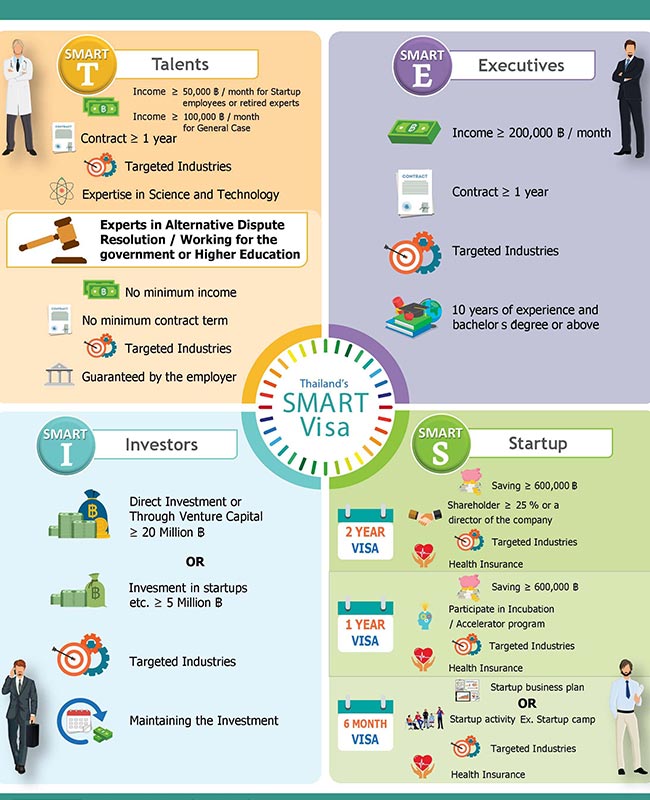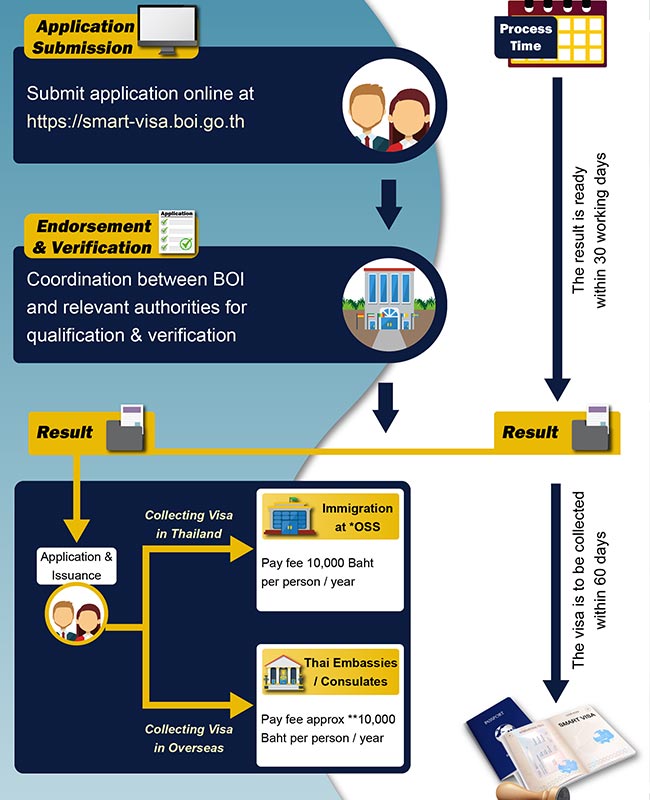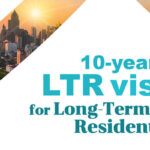The SMART Visa is a Board Of Investment (BOI) initiative to boost Thailand's economy through innovation.
The aim is to attract highly qualified individuals in specific areas of industry, to help the country grow through new talent and technology.
In this post, we'll take at deep dive on the SMART Visa categories and their eligibility requirements, and the potential benefits of the visa.

Contents
What Is a SMART Visa?
The SMART Visa is targeted at highly skilled workers, investors, executives, and entrepreneurs.
There are four key categories that you can apply under:
- Talent
- Investor
- Executive
- Startup
The idea is to attract highly skilled people to work in Thailand in specific industries, known as S-Curve industries. The industries are as follows:
- Automation and Robotics
- Aviation and Logistics
- Biofuels and Biochemicals
- Next-Generation Automotive
- Smart Electronics
- Affluent, Medical and Wellness Tourism
- Digital
- Medical
- Alternative Dispute Resolution
- Human Resource Development in Science and Technology
- Environmental Management and Renewable Energy
- Agriculture and Biotechnology
- Food for the Future
What are the Benefits of a Thai SMART Visa?
The main benefit is a 4-year permission to stay (except the Startup Visa, which has a maximum of 2 years validity).
Immigration reports are yearly rather than the usual 90-days we are used to on Non Immigrant Visas. No re-entry permit is required to leave the country (and keep the visa active).
To make you feel that little but more important, you'll get access to a fast-track service at international airports in Thailand, helping you move quickly through immigration checks.
The visa also offers work eligibility for spouses and children of SMART Visa holders, without the need for a work permit.
SMART Visa Categories

SMART Talent Visa (T)
The Talent Visa is for science and technology experts who earn a minimum of 100,000 + Baht per month.
You will need to have an employment or service contract with a company or institution in Thailand. The remaining term of your contract must be at least 1 year when you apply.
If you have an employment contract with a startup company, or you are a retired expert with an endorsement from a relevant agency, you can have a minimum income of no less than 50,000 Baht per month.
SMART Investor Visa (I)
The Investor Visa is for investors who make a direct investment, as an individual investor or through a venture capital company, of 20 million Baht in a technology-based company that manufactures or delivers services for one of the aforementioned S-Curve industries.
Or, you can invest a total amount of at least 5 million Baht in a startup, incubation, or accelerator program endorsed by relevant agencies relevant government agencies such as the National Innovation Agency (Public Organization), Digital Economy Promotion Agency, and National Science and Technology Development Agency. The investment can be spread across more than one company.
SMART Executive Visa (E)
The Executive Visa is available to senior managers that earn a minimum of 200,000 Baht per month, have a minimum of a Bachelor’s degree education, and ten years work experience.
Your employee must be certified as technology-based in manufacturing or delivering services in the targeted industries by relevant government agencies (as listed previously).
SMART Startup Visa (S)
The Startup Visa is targeted at entrepreneurs who want to start a business in Thailand.
Eligibility is based on a deposit of 600,000 Baht in Thailand, or the same amount in your home country bank account for no less than 3 months.
You must set up a company in one of the ten targeted industries within the first year of your visa. You must own at least 25% of the company or hold the position of a director.
If you are accompanied by a spouse or children, an additional deposit of no less than 180,000 Baht per person is required. This can be held in a bank account in Thailand or in the country of your nationality or residence. The latter requires you to have held the equivalent balance for at least 3 months.
The visa also requires you to have health insurance, and for any family members that accompany you on the visa.
How to Apply for a SMART Visa
Step 1:
First you need to apply online for your qualification endorsement. You can register for this at https://smart-visa.boi.go.th.
Once registered, you need to complete an application form for the type of SMART Visa you wish to apply for (T, I, E, S, and O if any).
You will need PDF versions of the required documents to upload via the website. These documents form part of your application.
Step 2:
After 30 days, you will receive notification of your application. Immigration, the Ministry of Foreign Affairs, and the relevant agencies will also be informed of the result. If successful, you will receive an endorsement letter, which is required to apply for your SMART Visa.
Step 3:
At this point you can apply for your SMART Visa. You can do this in one of three places:
- The Royal Thai Embassies/The Royal Thai Consulate Generals (in case of residing overseas)
- The Immigration at One Stop Service Center for Visa and Work Permit(OSS), Chamchuri Square Building, Bangkok
- EEC Labour Administration Center in Chonburi
This must be done within 60 days of the issuance date of the endorsement letter.
The processing fee is 10,000 Baht per year of visa permission, and must be paid in cash.

Can a SMART Visa be Extended?
Yes. You should apply at least 60 days before your current visa expires, because it takes 30 working days to be issued a qualification endorsement. You will have to resubmit your documentation to obtain approval for your extension.
Is the SMART Visa Worth It?
To date, over 1,000 people have been issued SMART visas, since 2018.
The UK and US lead the way in terms of applicant numbers, with Germany, France, Australia, Japan, and India not far behind.
Not many people seeking a long-term visa will qualify for one of the SMART Visa categories, but it does present an additional pathway to a long-term stay in the Kingdom, particularly for those skilled in the required industries who want to work for a company in Thailand.
I think the monthly salary requirements are quite fair and not overly prohibitive, given the skill level of the workers the scheme seeks to attract. Even the investor requirements aren't as high as I thought they might be.
Additionally, as a startup, you don't have to keep your 600k Baht in a Thai bank, if, that is, you have proof of it being in a bank account in your home country or country of residence for at least 3 months prior to your application. This differs to a retirement or marriage-based visa extension, for which the money must be held in a Thai bank account.
Looking at the data, it's clear that the scheme is predominantly being used for the Talent and Startup categories. In fact, startups account for 560 visas issued to date.
I wonder if the 250 Talent visas issued to date are largely employees of those Startups. And I wonder if the 50 Entrepreneur visas issued to date are largely those for investors investing in the Startups?
I also wonder how many of those startups aren't just digital nomads working an angle for a long stay – 600,000 Baht in a Thai bank and you can start a “tech agency”.
Maybe I'm being too cynical here, as I do know of a couple of companies who have set up under the BOI previously and are doing very well.
It makes sense, though. Thailand's cheap cost of living, business expenses and labour makes it a good choice of country in which to start a business.
Potential Downsides
However, there are a couple of downsides / disappointments that spring to mind when looking at the requirements and benefits:
- The expense: If you have a wife and two children, you will have to pay a total of 40,000 Baht per year for 4 years for the visa. That's not far off the cost of a UK settlement visa on the 5-year route to residence. If you're earning a great salary I guess it's no big deal; your company is probably paying, anyway.
- The lack of long term benefit: Once your SMART visa expires there is no guarantee of it being extended, although it likely will be if you are still in the same job or your company has grown. However, if your circumstances change – you move job position or change the company's direction – you may not get your extension. Where does that leave your life in Thailand after 4 years, by which time you will be heavily invested in the country.
For some, the SMART Visa route may be a lot to take on with no permanent outcome at the end. Even if your business brings in millions of Baht a year in tax revenue, 4, 8, or even 12 years down the line you are not guaranteed any indefinite leave to remain, or similar residence benefit.
My feeling is that the scheme would be far more appealing if there was a pathway to residency, or even the opportunity to personally own land and property without restriction, after a certain period on the SMART Visa.
After all, many of the people on these visas will have invested heavily, both financially and personally, in Thailand, yet their futures will indefinitely be subject to the same visa restrictions.
Tips for an Easier Life in Thailand
Get Good Health Insurance:
+ Start with a quick quote from Cigna. Takes just 2 minutes.
Improve Your Thai Skills:
+ Learning Thai makes life here easier and more fun. I use Thaipod101. It is free to get started & easy to use.
Send Money to Thailand:
+ Use Transferwise. It is fast, cheap, and gives you the market exchange rate. Me and the majority of my readers are using it.
Protect Your Online Privacy:
+ A VPN protects you against hackers and government snooping. I always use one. You should too. Read why here.
Last Updated on



JamesE says
Aug 20, 2022 at 10:54 pm
TheThailandLife says
Aug 21, 2022 at 3:10 am